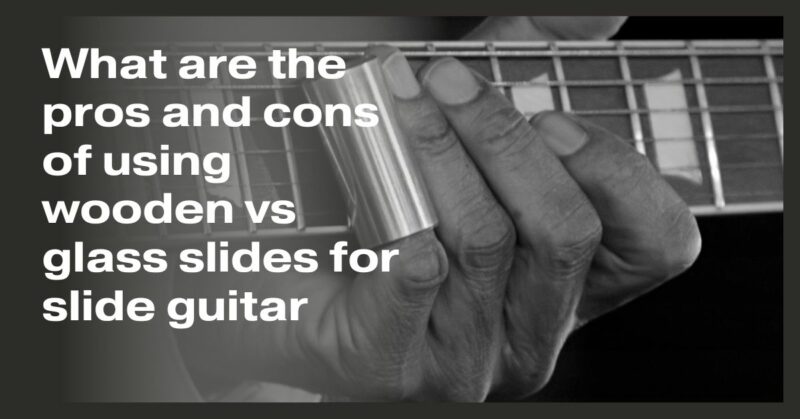Slide guitar is a captivating and expressive technique that has been used in various music genres, from blues and rock to country and world music. Choosing the right slide is crucial for achieving the desired tone and playability. Two common choices for slide material are wood and glass. In this article, we’ll explore the pros and cons of using wooden vs. glass slides for slide guitar to help you make an informed decision about which option suits your playing style and preferences.
Wooden Slides:
Pros:
- Warm and Mellow Tone: Wooden slides are known for their warm and mellow tone, making them ideal for blues, folk, and acoustic slide guitar. They produce a smooth, rounded sound that can evoke a vintage or rootsy feel.
- Lightweight: Wooden slides are generally lightweight, making them comfortable for extended playing sessions. Their reduced weight can be less fatiguing for your hand and wrist.
- Natural Feel: Many guitarists appreciate the natural feel of a wooden slide against the strings. The wood’s tactile qualities can provide a unique connection between the player and the instrument.
- Sustain: Wooden slides often offer good sustain, allowing notes to ring out and blend seamlessly with the guitar’s natural resonance.
Cons:
- Limited Brightness: Wooden slides tend to produce a mellower tone, which may not be suitable for genres that require bright and cutting slide sounds, like some rock or country styles.
- Durability: Wooden slides can be more prone to wear and damage over time compared to their glass counterparts. They may need more frequent replacement or maintenance.
Glass Slides:
Pros:
- Bright and Crisp Tone: Glass slides are celebrated for their bright and crisp tone, making them well-suited for genres where clarity and definition are crucial, such as blues-rock or country.
- Sustain: Glass slides often offer excellent sustain, allowing you to sustain notes for extended periods, creating a dramatic and expressive effect.
- Durability: Glass slides are durable and less prone to wear and tear. They can withstand heavy use and maintain their tone and appearance for a long time.
- Smooth Sliding: Glass slides glide smoothly over the strings, making it easier to execute precise slide techniques, like vibrato and quick position changes.
Cons:
- Weight: Glass slides tend to be heavier than wooden slides, which can cause hand and wrist fatigue during prolonged playing sessions.
- Less Natural Feel: Some players find that the smooth and slippery surface of a glass slide may not offer the same tactile feedback as a wooden slide.
- Brittleness: While glass slides are generally durable, they can break if dropped or mishandled, potentially leading to unexpected replacements.
Conclusion
The choice between wooden and glass slides for slide guitar ultimately comes down to your playing style, musical preferences, and the sound you wish to achieve. Wooden slides excel in producing warm and mellow tones, making them a favorite for acoustic and traditional blues players. On the other hand, glass slides offer bright and cutting tones, making them a go-to choice for rock and country slide guitarists. It’s worth experimenting with both materials to determine which slide suits your playing style and musical goals. Ultimately, the right slide will enhance your slide guitar technique and help you create the perfect sound for your music.


